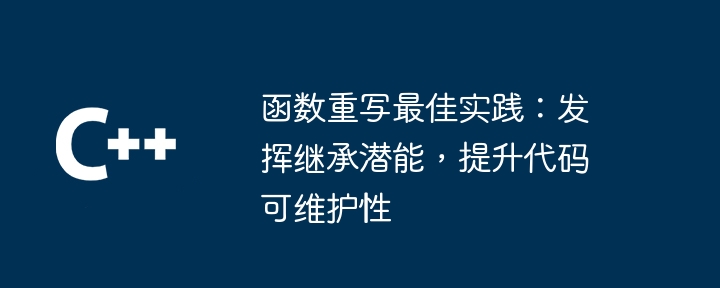
Best practices for function rewriting: Ensure encapsulation: only rewrite the behavior that needs to be changed. Use override annotations: explicitly indicate overriding parent class methods. Follow the Liskov substitution principle: derived class objects can replace parent class objects without changing program behavior. Avoid virtual methods: overriding is preferable and provides stronger type checking.

Best practices for function rewriting: unleash the potential of inheritance and improve code maintainability
In object-oriented programming, inheritance It is a powerful mechanism for achieving code reuse and polymorphism. Through function overriding, the behavior of the parent class can be extended to meet the specific needs of the derived class. Following best practices is critical to ensuring the effectiveness of function overrides and code maintainability.
1. Ensure encapsulation
When rewriting a function, the encapsulation of the parent class implementation should be maintained. This means overriding only the behavior that needs to be changed, without breaking the original implementation. For example:
class Animal:
def make_sound(self):
return "Generic animal sound"
class Dog(Animal):
def make_sound(self):
return "Woof!"2. Use the override annotation
In the derived class of the overridden function, use the @override annotation to clearly indicate that it is being overridden Parent class method. This helps document your code and avoid accidental overwrites. For example:
@override
class Dog(Animal):
def make_sound(self):
return "Woof!"3. Follow the Liskov substitution principle
Function rewriting should follow the Liskov substitution principle, that is, subclass objects must be able to replace their parent class objects, and the program Behavior will not change. This ensures that derived classes behave as expected. For example:
class Shape:
def calculate_area(self):
raise NotImplementedError()
class Rectangle(Shape):
def __init__(self, width, height):
self.width = width
self.height = height
def calculate_area(self):
return self.width * self.height4. Avoid virtual methods
In most cases, using overrides is preferable to virtual methods. Overriding provides stronger type checking and allows subclasses to determine the superclass's implementation at runtime. For example:
class Animal:
def make_sound(self):
pass
class Dog(Animal):
def make_sound(self):
return "Woof!"Practical case
The following is a practical case that shows how to use functions to override the behavior of extended parent classes:
Consider a Employee Parent class, which contains a calculate_salary method. Now, we need to create a Manager derived class that has its own calculate_bonus method.
class Employee:
def __init__(self, name, salary):
self.name = name
self.salary = salary
def calculate_salary(self):
return self.salary
class Manager(Employee):
def __init__(self, name, salary, bonus):
super().__init__(name, salary)
self.bonus = bonus
def calculate_salary(self):
total_salary = super().calculate_salary() + self.bonus
return total_salary By overriding the calculate_salary method, the Manager class can calculate the total salary including bonuses without destroying the Employee class Original implementation.
The above is the detailed content of Best practices for function rewriting: unleash the potential of inheritance and improve code maintainability. For more information, please follow other related articles on the PHP Chinese website!




